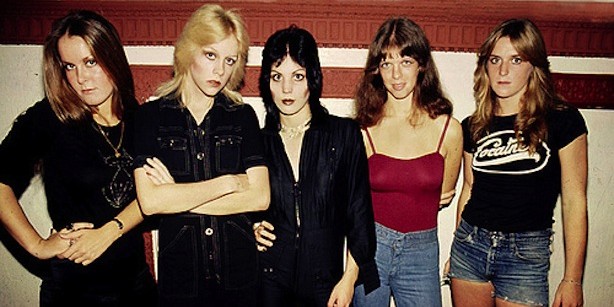 Music
Music
Runaways bassist says producer Kim Fowley drugged and raped her
by Jeremy Mersereau
July 9, 2015
This is the first time she has spoken out about the incident.
Groundbreaking ’70s rock group The Runaways remain a vital and essential part of rock ‘n’ roll history and popular culture as a whole. Though never an enormous success in North America during their heyday, their impact is still felt in the individuals, bands, and movements that followed: artists like Courtney Love, HAIM, and the entire riot grrrl movement all travel the trail that the Runaways blazed. The still-incendiary “Cherry Bomb” is a musical shorthand for empowerment and insubordination against the status quo, not to mention being a blistering kick-ass song to boot.
The band came together at the relentless insistence of producer, songwriter and rock svengali Kim Fowley, who met teenage guitarist Joan Jett in 1975 and immediately set about trawling the Sunset Strip for complementary players to fulfill his vision of an all-girl rock band. Fowley, who died of bladder cancer last January, has had credits in the liner notes of literally hundreds of rock albums over the years, his most recent before his death as a co-writer on Ariel Pink’s 2014 album pom pom. He’s been described as “forever part of American music” and someone who had “been everywhere, done everything, knew everybody.”
He’s also likely a rapist: a story over at Huffington Post Highline details his 1975 attack of Runaways bassist Jackie Fuchs (stage name Jackie Fox), as well as various other sexual assaults and degrading acts towards his young charges over the years.
Fuchs says that after a New Year’s Eve Runaways show at a California club she was given Quaaluudes at a motel and raped by Fowley in front of multiple witnesses, including fellow Runaways Cherie Currie and Joan Jett. The occurrence of the rape is backed up by Runaways songwriter Kari Krome (née Cari Lee Mitchell), who was then still a teenager:
And Jackie was dead, dead, dead drunk—like corpse drunk. She was just laying down on her back, sound asleep, out of it.” Krome says Fowley picked up Jackie’s arm “and it flopped down like a marionette. … He had to manually move her body parts into positions that he wanted for himself.” …She was confused why nobody did anything to end the attack. She recalls that Jett and Currie were sitting off to the side of the room for part of the time, snickering.
Through a representative, Joan Jett has denied witnessing the rape as told by Fuchs, and has directed all inquiries about the incident to go to Fuchs, “as it’s a matter involving her and she can speak for herself”. Currie, for her part, claims she stormed out of the room in disgust. She later planned to fictionalize the incident in the expanded version of her 1989 autobiography Neon Angel, transposing Fox into another bystander instead of the victim. When Fuchs threatened legal action, the new edition was pulled by the publisher.
Krome also accuses Fowley of sexual assaulting her on multiple times:
When Krome asked what was going on, he said something like, “It’s time for dog worship” and told her if she didn’t give in to his sexual demands, she’d have to go back to Long Beach. “I didn’t know how to say, ‘I don’t want you to do this,’” Krome says. “I did not have that voice. … I was also scared of him. He could be really scary.”
After reading Krome’s comments about the rape (though Krome didn’t mention her by name) in the 2013 Runaways biography Queens of Noise, Fox decided to come forward.
Sadly, if the accusations are true, it won’t be surprising: it seems like every day another story comes out about someone abusing their position of power to take advantage of young women. Fuchs herself says she was inspired to tell her story when she started noticing the depressing trend:
She told me she never thought she’d go public with her rape, but last fall, she started seeing similar stories everywhere. Jackie saw herself in those young women and knew all the hurt and shame that awaited them. “They have to be making the same value judgments about themselves as I made about me,” she explained. “I know from personal experience how all those things can eat away at you. They can take vibrant young people and turn them into something else.”
Whatever else, Fuchs should be applauded for coming forward and telling her story. It takes tremendous strength to do so, unfortunately even in 2015 (and it was no doubt nigh-unthinkable in the ’70s).
[H/T Huffington Post Highline]
Tags: Music, News, kim fowley, the runaways


